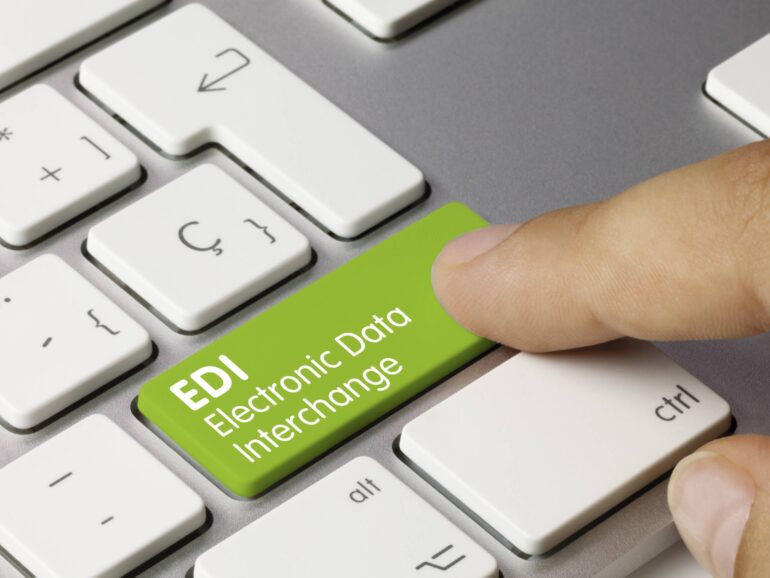There are multiple ways to exchange data in an organization. EDI, or Electronic Data Interchange, is a quick and effective way to share information and transfer files or documents within an organization. It is an easy and credible process that businesses use to exchange crucial information.
This process of sharing essential files and documents is cost-effective, reduces paper consumption, and saves unnecessary expenditures.
However, many people believe that with the evolution of technology, sharing files and other documents has become much easier. Nowadays, the availability of new software and applications has forced businesses to shift to the latest technology, which is affecting EDI’s use and relevance in different organizations.
In this article, you will get insights into a few things that you must know about electronic data interchange.
Is EDI Becoming Obsolete?

Nowadays, the demand for cloud-based solutions and API integration in the blockchain network is rising with recent advancements in technology. Businesses are using these modern methods to share real-time information, which has made sharing information much easier to stay ahead of the competition.
This resulted in the limited use and relevance of electronic data interchange in a few industries. However, EDI is still used and relevant in a few industries, such as healthcare, finance, and transportation. Businesses that deal with supply chain logistics and transportation use this easy and reliable process to receive and generate messages in electronic format. Suppose you are looking forward to establishing an electronic transfer system in your organization, then head on over to this website to learn more about EDI integration and its applications.
Furthermore, if you are looking to exchange, share, and transfer information or any type of document within an organization, the integration of EDI can increase efficiency and security compared to the traditional pen-and-paper format. It is an electronic format that is limited to a standardized format within organizations using the same technologies. The EDI network still offers several benefits that make it an ideal option in a few sectors.
The primary benefit is improved efficiency, which can be achieved by automating the entire data exchange process. In addition, this method prevents manual data entry, which reduces the chances of errors and mistakes, increases accuracy, and can complete selected operations within a specific period. It takes less time to complete a transaction and saves time for companies with a faster transaction process.
5 Factors Affecting the Use and Relevance of EDI in the Different Organizations

1. Increasing Use of Cloud-based Solutions
The cost and complexity of establishing and maintaining an electronic format to share files and documents is a major hindrance to EDI becoming obsolete. Nowadays, businesses have shifted to cloud-based solutions that are easier to operate and less complex compared to EDI.
Furthermore, this technology in the blockchain network is a budget-friendly option and can be established in an organization. All these cloud-based alternatives offer the same features, along with the flexibility to work and operate collaboratively.
Organizations can send real-time information and share files and other crucial documents without the need to integrate additional software or hardware.
2. Advanced API Integrations
Another major challenge with EDI becoming obsolete is due to advanced API integrations that have limited the use of API in different organizations. API, or Advanced Programming Interface, integration is another flexible and cheaper alternative to electronic data interchange.
Modern API integrations provide better and faster features than EDI, making them an ideal replacement in a variety of industries. It allows businesses to easily communicate and work with their customers and clients, irrespective of the technology they use.
3. The Rise of Blockchain Technology
Blockchain technology is the future of business networks because it allows organizations to maintain transparency while transferring data and documents. Blockchain technology offers a platform to store information in small blocks that are connected to a single network.
This might lead to the potential obsolescence of sharing information through electronic formats in multiple industries. Businesses can use blockchain technology to create a decentralized platform with features similar to those of an EDI.
In addition, it eliminates the use of intermediaries like EDI networks. Using blockchain technology also improves the efficiency and productivity of an organization and reduces overall expenses.
4. Inefficient in providing real-time data

The latest cloud-based alternatives and API interfaces allow organizations to share data and transfer files in real-time. The EDI networks are based on batch systems that allow the transfer of data in large batches. This is a major drawback for businesses that want to make use of the real-time information-sharing feature to stay ahead of the curve. Data sharing and file transfers can take hours or even days using electronic formats.
However, it’s based on the size of the file and the amount of information you are willing to exchange. Nowadays, newer and more advanced technologies such as IoT and Industry 4.0 require real-time data sharing. Using electronic formats can lead to inefficiencies in operating a business, making EDI networks obsolete day by day.
5. Standardized Data Formats
The EDI network is based on standardized data formats, which can make it difficult for businesses to share data with customers and clients due to differences in technology or operating systems.
This is a major drawback for businesses, as it results in manual operations and increases managerial expenses. This makes EDI inefficient and obsolete compared to modern methods of exchanging data and information.
The Bottom-line
In conclusion, EDI integration in an organization provides plenty of benefits to businesses, including improved efficiency, data accuracy, and better relationships with clients and customers. However, these benefits and features are in comparison to traditional paper-based methods.
The application of the latest cloud-based alternatives, API integration, and blockchain technology is a challenge to electronic data interchange and can make electronic transfers less appealing to organizations that are looking to switch to the latest technology.
Organizations should carefully evaluate their needs and weigh the costs and benefits of EDI before making any decisions.

